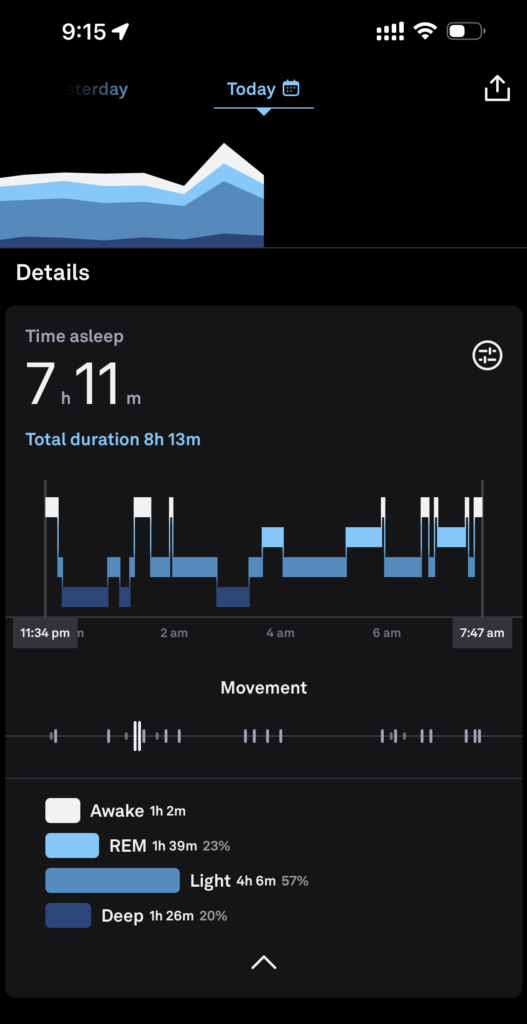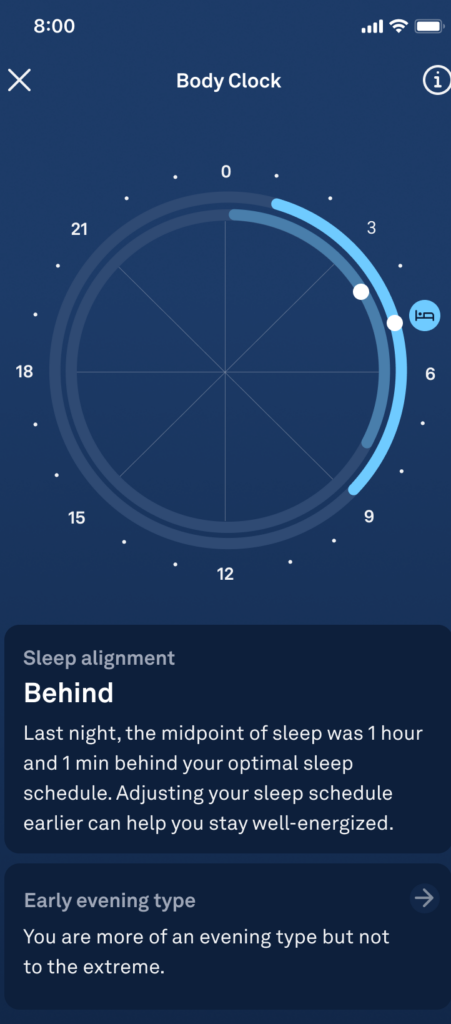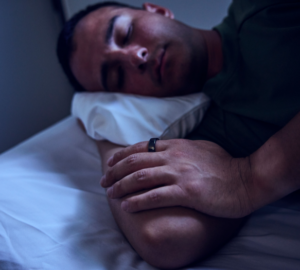- Sleep inertia can occur immediately after waking up, causing you to feel drowsy, groggy, and tired — even after a decent night’s sleep.
- Causes of sleep inertia include waking up in the wrong sleep cycle, accumulated sleep debt, poor sleep quality, and misalignment with your chronotype.
- To avoid sleep inertia, try to get morning sunlight, sleep in alignment with your chronotype, eat a balanced breakfast, and exercise regularly.
Whether you only experience it rarely or you feel sleepy every morning, most of us are familiar with “sleep inertia,” or feeling groggy upon waking up. Sure, chugging a cup of coffee can help, but experiencing this on a regular basis can be very uncomfortable — and frustrating.
Fortunately, it’s not totally unavoidable. Understanding the science behind sleep inertia can empower you to take control over factors you can modify, and start feeling more energetic upon waking up.
What is Sleep Inertia?
Sleep inertia is defined as the feeling of grogginess upon waking. It is associated with poor cognitive performance that gradually dissipates as the day goes on.
When you experience sleep inertia, you may feel drowsy — like you have “brain fog” — and it can last for a few minutes to a couple of hours, depending on various factors.
“An example of sleep inertia is that feeling of confusion you have after you wake up from a long afternoon nap,” explains Raphael Vallat, PhD, Senior Machine Learning Data Scientist at Oura and former sleep researcher at the University of California, Berkeley.
In extreme instances, you may feel disorientated — questioning your surroundings and how long you’ve been asleep for. But you can experience milder sleep inertia as well. In fact, it may have become so commonplace that you’ve simply decided you’re just not a morning person.
Beyond an inconvenience, sleep inertia can also be a danger. “If you have to drive, or make a life-critical decision in the first minutes after awakening, like a doctor on call, sleep inertia can have serious consequences,” Vallat comments.
Sleep inertia is also considered a causal factor of road traffic and occupational accidents, accounting for thousands of deaths every year. It may also contribute to work absenteeism, work-related loss of productivity, and more utilization of healthcare resources.
RELATED: What Is Your Chronotype and Why Does It Matter?
Daytime Alertness: It’s Not All In Your Genes
It might be tempting to blame your morning grogginess on your genes, but research shows that’s not the sole influence.
In a recent study, Vallat and a team of scientists studied 833 twins and genetically unrelated adults to learn more about how people wake up and regain alertness in the hours after sleep.
The researchers estimated that 25% of the variations in daytime alertness come from genetic factors. But 75% of your daytime alertness is influenced by several independent — and modifiable — factors.
These factors include:
- How much sleep you got the night before: Sleeping more, specifically waking up later than your typical wake-up time, was associated with higher alertness. This may be because sleeping later increases the likelihood of waking up during a lighter stage of sleep (which is what you want!). Plus, the more sleep you get, the more you can clear adenosine (a neurotransmitter that makes you sleepy) and discharge sleep pressure.
- Your physical activity level the day before: Staying active during the day was linked to higher alertness.
- What you eat for breakfast — and your body’s response to it: A breakfast rich in complex carbohydrates (like a bowl of oatmeal) was associated with higher morning alertness. In the study, blood glucose levels were measured with a continuous glucose monitor. Breakfasts with a lower glycemic load (i.e. slow-release carbohydrates, like oats) increased alertness. To compare, consuming a pure glucose liquid, which causes a sharp spike (and subsequent drop) in blood sugar, caused the largest reduction in daytime alertness.
- Your mood: The happier you feel, the more alert you’ll feel during the day, researchers found. One reason: Serotonin, the “happy hormone,” promotes cognitive arousal and alertness.
- Your age: While not exactly modifiable, older age was found to be positively predictive of higher inherent levels of alertness.
3 Common Triggers of Sleep Inertia
Beyond the lifestyle factors above that may influence one’s daytime alertness, there are several causes of sleep inertia, Vallat notes.
1. You wake up in the wrong sleep cycle.
Sleep inertia can happen when you wake up in a deep stage of sleep, either deep sleep or REM sleep. Light sleep, as the name suggests, is the closest to wakefulness. This is the sleep stage you naturally (and ideally) wake up in, but that’s easier said than done.

In the real world, alarm clocks, light exposure, noisy neighbors, or a crying baby — among other things — can wake you up from deep sleep, before your body has transitioned to light sleep. This can result in sleep inertia.
“Waking up while in deep sleep is like trying to sprint before you’ve warmed up,” Vallat says. Not just metaphorically – literally! During deep sleep, your body temperature is the lowest. When you get abruptly woken out of deep sleep, your brain has to warm up and get some blood flowing before it can work properly. In light sleep, your body temperature is the warmest, mirroring your awakened state.
When you wake up during REM sleep – where most vivid dreams occur – you may also experience sleep inertia. In REM sleep, melatonin levels are at their peak. Melatonin, a sleep-inducing hormone, can cause the drowsy characteristic of sleep inertia.
READ MORE: Everything You Need to Know About Melatonin
2. You’ve accumulated sleep debt and/or you’ve slept poorly.
You may have gotten 10 hours of sleep last night, but your quality and quantity of sleep leading up to last night still factors into how you feel upon waking.
That’s why one contributor to your daily Oura Readiness Score is your Sleep Balance. This measures how much you’ve been sleeping in the past two weeks, with the past few nights of sleep weighing more heavily, and is an indicator of how much sleep debt you have.
Research shows that a consistent lack of sleep leads to exaggerated feelings of sleep inertia, and another study found that people who slept six hours experienced a 10% decline in cognitive performance.
Finally, even if you do sleep enough, you might not be sleeping well. Restless sleep, frequent awakenings, and sleeping later than usual can all cause sleep inertia. They disturb your sleep and your ability to transition through sleep stages.
Oura members can check their Sleep Score contributors, especially Efficiency and Restfulness, to learn more about the quality of their sleep.
READ MORE: Sleep Debt: Is It Possible to Catch Up on Lost Sleep?
3. You’re misaligned with your chronotype.

Your circadian rhythm is your body’s natural clock, and your chronotype refers to whether you’re a morning or night person. When either of these rhythms is misaligned with your daily routine, it can cause sleep inertia.
“If you’re perfectly aligned with your chronotype, waking up should feel easy,” Vallat says. “If you fight with yourself to get out of bed every morning, it’s a good indicator there’s something off with your sleep alignment.”
Night owls, unfortunately, have a higher risk of sleep inertia. While it’s a cultural norm to start the day early in the morning, these “evening types” may get their best, deepest sleep in the early hours of the morning, which can be disrupted when the alarm goes off.
On the other hand, waking up before the sun may also lead to sleep inertia. Waking up while it’s still dark can throw off your natural hormone production, triggering sleep inertia.
RELATED: How This Oura Member Learned to Embrace Her “Evening” Chronotype & Align to Her Ideal Schedule
How to Avoid Sleep Inertia
The number-one way to avoid sleep inertia is, of course, to get enough sleep — both in terms of quality and quantity. Here are other science-backed tips that can help you wake up feeling bright-eyed and bushy-tailed.
Strive for circadian and chronotype alignment. Use Oura’s Body Clock and chronotype feature to make sure you are sleeping in line with your chronotype and circadian rhythm.
Focus on consistency. Track your sleep and wake times in the Oura App, and aim to go to bed and wake up at similar times — yes, even on weekends.
Forego the alarm if you can. If you wake up only to see you still have 30 more minutes before your alarm, go ahead and get up, Vallat suggests. This is because when you awake naturally, you’re probably at the end of a complete sleep cycle. Plus, hitting the snooze button prolongs sleep inertia – so if you have to use an alarm, try not to hit snooze.
Get morning sunlight upon rising. To help reset your circadian rhythm, get daylight into your eyes as soon as you can. Morning daylight suppresses melatonin and activates your sympathetic nervous system, helping you feel alert in the morning.
Eat a breakfast rich in complex carbohydrates. Low blood sugar levels in the morning can exacerbate sleep inertia – but choose your morning meal wisely! Consuming a well-balanced breakfast with plenty of complex carbohydrates like oats or whole-grain bread can stabilize your blood sugar and help you feel energized.
Don’t solely rely on coffee, but feel free to enjoy a cup. You may assume coffee would be an effective way to shake off your groggy, sleep-inertia state. In reality, “caffeine isn’t a great remedy for sleep inertia, because it takes 30 minutes to work,” says Vallat.
However, there might be a benefit to the simple ritual of brewing a cup of joe. A recent study postulated that the mere ritual of your morning brew – smelling the coffee, enjoying the taste – can signal to your brain that it’s time to start your day.
Move your body today and tomorrow. Staying physically active throughout the day reduces the likelihood of sleep inertia the following morning. With Oura, you’ll receive inactivity alerts if you’ve been stationary for 50 minutes to encourage regular movement.
Plus, a morning workout — even a super quick one — can help to kick sleep inertia to the curb. A study found that just 30 seconds of high-intensity exercise reduces sleepiness and triggers the cortisol-awakening response.
Try a cold shower, cold plunge, or just a cold splash. “One of the easiest and most effective ways to counteract sleep inertia is to simply splash your face with cold water, and immerse your hands in it,” Vallat says. This adrenaline boost can regulate your body temperature as it works to warm you back up.
Limiting daytime naps to 30 minutes, max. When it comes to naps, it’s the earlier and shorter the better! After sleeping for 30 minutes, you move into a deeper sleep stage and are more likely to trigger sleep inertia.
LEARN MORE: How Long Should You Nap?
About the Oura Expert
Raphael Vallat, PhD, is a senior machine learning data scientist at Oura. He previously worked as a sleep researcher in the Center for Human Sleep Science at University of California Berkeley (Prof. Matt Walker‘s lab). He has published extensively on the topic of sleep and human health, and his work has been featured in several major news media and podcasts. In his free time, you can find him enjoying precious moments with his amazing wife and daughter, playing music, or hiking with friends.




